.
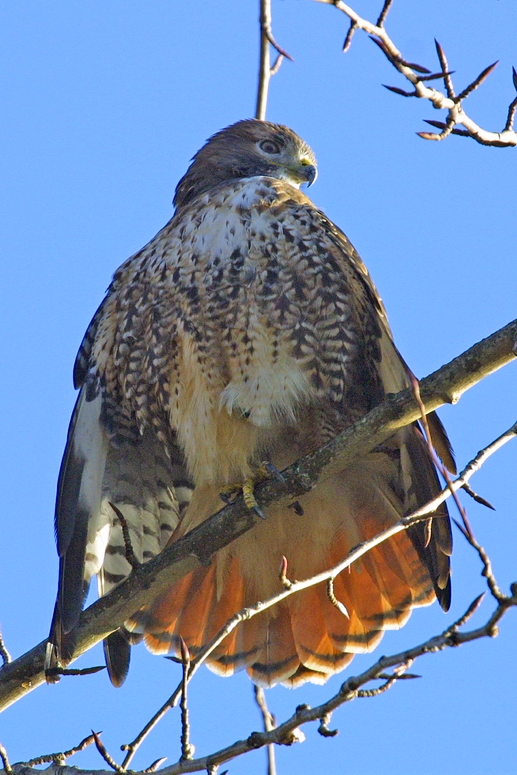
Red-tailed Hawk (Buteo jamaicensis): photo by Alan D. Wilson, 2003
I
The broken pillar of the wing jags from the clotted shoulder,
The wing trails like a banner in defeat,
No more to use the sky forever but live with famine
And pain a few days: cat nor coyote
Will shorten the week of waiting for death, there is game without talons.
He stands under the oak-bush and waits
The lame feet of salvation; at night he remembers freedom
And flies in a dream, the dawns ruin it.
He is strong and pain is worse to the strong, incapacity is worse.
The curs of the day come and torment him
At distance, no one but death the redeemer will humble that head,
The intrepid readiness, the terrible eyes.
The wild God of the world is sometimes merciful to those
That ask mercy, not often to the arrogant.
You do not know him, you communal people, or you have forgotten him;
Intemperate and savage, the hawk remembers him;
Beautiful and wild, the hawks, and men that are dying, remember him.
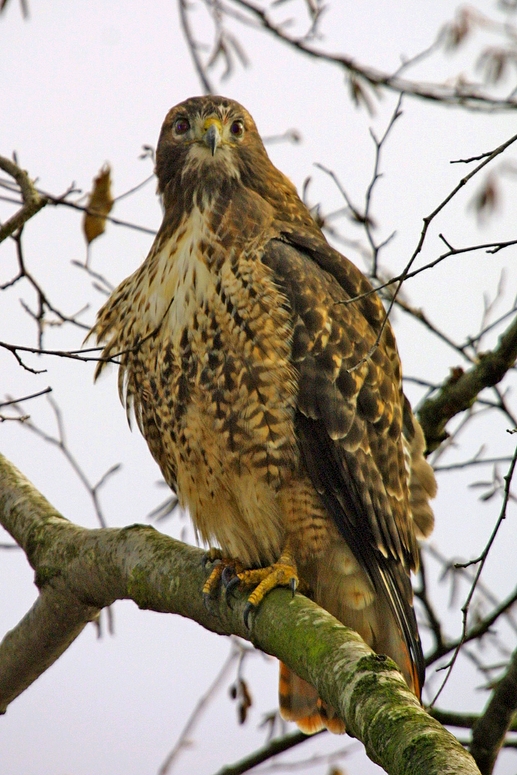
Red-tailed Hawk (Buteo jamaicensis), near Colony Farm Regional Park, British Columbia: photo by Alan D. Wilson, 2003
II
I’d sooner, except the penalties, kill a man than a hawk; but the great redtail
Had nothing left but unable misery
From the bones too shattered for mending, the wing that trailed under his talons when he moved.
We had fed him for six weeks, I gave him freedom,
He wandered over the foreland hill and returned in the evening, asking for death,
Not like a beggar, still eyed with the old
Implacable arrogance. I gave him the lead gift in the twilight. What fell was relaxed,
Owl-downy, soft feminine feathers; but what
Soared: the fierce rush: the night-herons by the flooded river cried fear at its rising
Before it was quite unsheathed from reality.
Before it was quite unsheathed from reality.
Robinson Jeffers (1887-1962): Hurt Hawks, 1926
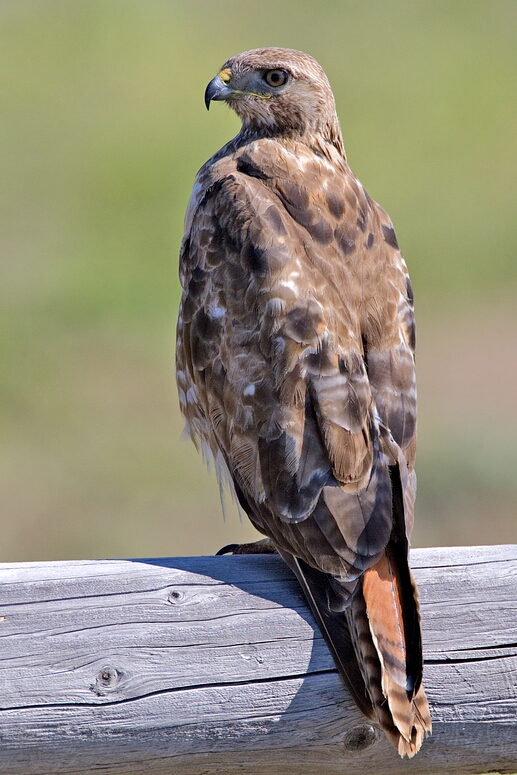
Red-tailed Hawk (Buteo jamaicensis), near Christmas Valley, Oregon: photo by Alan D. Wilson, 2003
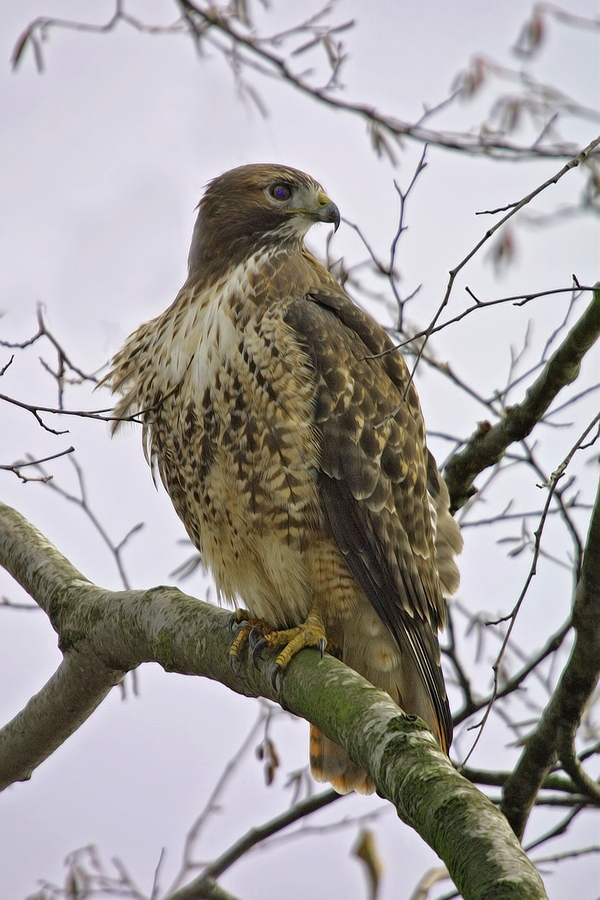
Red-tailed Hawk (Buteo jamaicensis), near Colony Farm Regional Park, British Columbia: photo by Alan D. Wilson, 2003
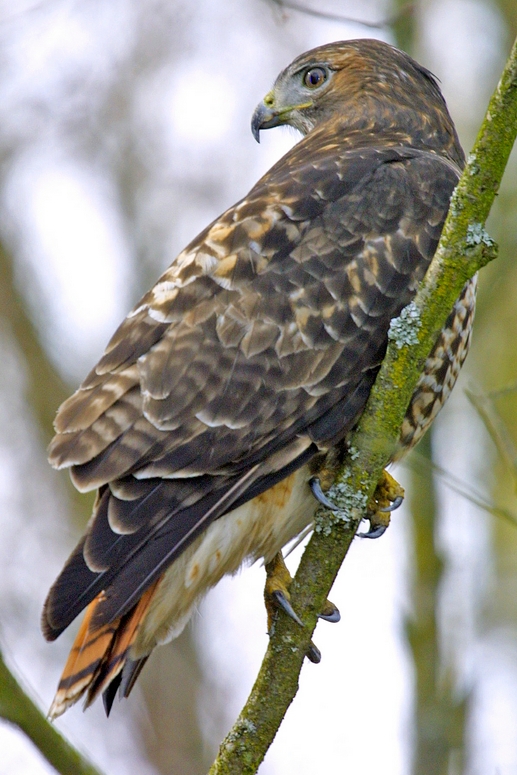
Red-tailed Hawk (Buteo jamaicensis): photo by Alan D. Wilson, 2004
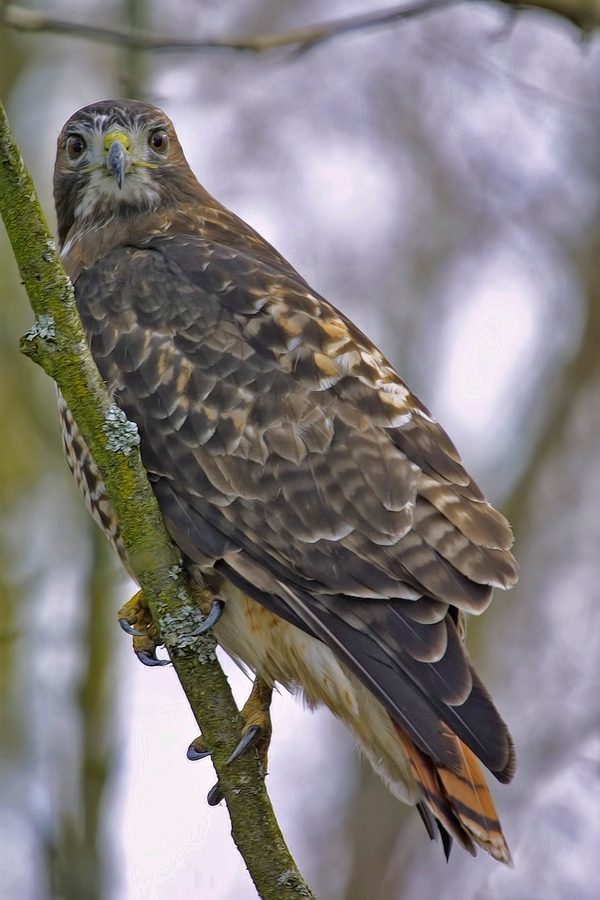
Red-tailed Hawk (Buteo jamaicensis): photo by Alan D. Wilson, 2004

Red-tailed Hawk (Buteo jamaicensis), Bella Vista Road, Vernon, British Columbia: photo by Alan D. Wilson, 2010

Red-tailed Hawk (Buteo jamaicensis), Bella Vista Road, Vernon, British Columbia: photo by Alan D. Wilson, 2010



8 comments:
Hawk Tower, constructed by hand by the poet himself at Tor House, Carmel, between 1920 and 1924.
The name memorializes a hawk that visited the tower while the stonework was going on, and vanished upon its completion.
The poem was writ two years after the tower was completed, and appeared in Jeffers' Cawdor and Other Poems in 1928.
A poet of grand tragic vision, categorically (if not altogether surprisingly) disowned by Postmodernism.
Robinson Jeffers: Autumn Evening
Robinson Jeffers: Evening Ebb
Robinson Jeffers: Rock and Hawk
Robinson Jeffers: Self-Criticism in February
Robinson Jeffers: The Great Explosion
Cuidado (Robinson Jeffers: Fire on the Hills)
And... same bird, very different California poet:
Kate Wolf: Redtail Hawk, live in studio, 1980, with Nina Gerber and Rick Byars
The elegiac note in this performance touches on several levels. Kate did not have long to live. But that inspired mandolin work by Nina Gerber draws a sweet wrinkle of a smile out of her.
The Redtail has a particular symbolic role also in the lore of Native American inhabitants of California.
"Red Tailed Hawk will soar beside the Two-Legged whose own gift of psychic vision may be exceptionally acute. This may take the form of precognitive dreams and/or ~visions~ during which these souls are quite literally able to 'see the future'... there will exist within the Red Hawk soul, the ability to pierce the veil that separates falsehood from truth. They will also possess an intensive gaze that can leave those who might find themselves the object of such a gaze, squirming under the penetrating stare."
Red Tailed Hawk
Saw one of these out back just the other day. Not hurt, but strong and sound. It shot across the air suddenly, came to rest for a minute high up in the branches of a red oak, and then plunged away into the forest. Hunting maybe, or maybe just enjoying life as a red-tailed hawk, slipping through to truth.
Jeffers always sobers one up, and for that we are grateful.
Beautiful, noble creatures--like Jeffers' poetry.
Tom,
Great to read "Hurt Hawk" here, as if for the first time -- "the lead gift."
9.13
light coming into sky above still black
plane of ridge, red-tailed hawk calling
in foreground, sound of wave in channel
textures of light and birds,
possibly side by side
on which both itself, place,
everything other than
grey white of fog reflected in channel,
cormorant flapping across toward ridge
Robinson Jeffers was the son of a Presbyterian minister who was also a professor of Old Testament textual studies and exegesis, a reserved, reclusive man who tutored his son at home in Greek and Latin and Calvinist doctrine.
The poet's own religious beliefs were singular. In 1934, responding to a query on this subject from Sister Mary Powers, he wrote:
"I believe that the Universe is one being, all its parts are different expressions of the same energy, and they are all in communication with each other, therefore parts of one organic whole. (This is physics, I believe, as well as religion.) The parts change and pass, or die, people and races and rocks and stars, none of them seems to me important in itself, but only the whole. This whole is in all its parts so beautiful, and is felt by me to be so intensely in earnest, that I am compelled to love it and to think of it as divine. It seems to me that this whole alone is worthy of the deeper sort of love and there is peace, freedom, I might say a kind of salvation, in turning one's affections outward toward this one God, rather than inwards on one's self, or on humanity, or on human imaginations and abstractions — the world of spirits.
"I think it is our privilege and felicity to love God for his beauty, without claiming or expecting love from him. We are not important to him, but he to us.
"I think that one may contribute (ever so slightly) to the beauty of things by making one's own life and environment beautiful, as far as one's power reaches.This includes moral beauty, one of the qualities of humanity, though it seems not to appear elsewhere in the universe. But I would have each person realize that his contribution is not important, its success not really a matter for exultation nor its failure for mourning; the beauty of things is sufficient without him.
"(An office of tragic poetry is to show that there is beauty in pain and failure as much as in success and happiness.)"
This quote from Jeffers makes me like and admire him even more.
"The beauty of things is sufficient without him"
Thinking about J A Baker in The Peregrine talking about washing away "the human taint".
He writes with that almost hieratic voice and still it's so particular, you can taste the matter of the words; the first eleven are a fine way into a poem.
Yes, that first line has haunted the nights and days: "broken pillar," "jags", "clotted": the whole matter of the poem condensed into those decisive word choices. The harsh strength of the active verb: a proud containment of all that pain, though the verb itself, in its very sound as much as in its signifying of something wrenched and torn beyond repair, confronts all the agony that the body has become, and cannot overcome.
"You do not know him, you communal people..." Here the speaker turns to us, seeking no solace in pity, acknowledging the isolation of death, unflinching in his gaze upon the ultimate fearsome fact of the real. As if to say, "there is nothing beyond this, but that which is larger than the individual".
And the profound entry to a whole world of implication in "unsheathed". Evanishment, a release of the spirit into freedom at last.
Post a Comment